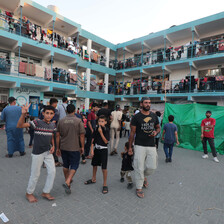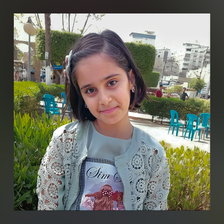The Electronic Intifada 31 August 2014

The writer (left) with his friend Ayman Shokor who was killed in an Israeli attack in Gaza.
I always wanted to meet my mother’s West Bank family, who I had not seen for more than a dozen years. Israel’s policies of separation imposed on the Palestinians in Gaza, where my father was born and where I grew up, and the West Bank, where my mother was born, made it impossible.
It took my mother twelve years to get a permit to visit her family in the West Bank.
She was only allowed to go because her eldest brother was dying in a hospital, a condition that didn’t apply to the rest of the family. No first-degree relative dying means no permit and thus more forced separation.
Our family has never been able to gather in one place. Even when my mother went to the West Bank, she could not see all her brothers and sisters. Each time, someone would be missing, someone would be displaced elsewhere.
Studying in Malaysia and having had my application for an Egyptian visa to go back to Gaza declined, I recently decided to go to Jordan instead. There I could see my relatives in Jordan and my West Bank family, who were supposed to gather to attend my cousin’s wedding.
But as Gaza was being bombed, and I suffered a grievous loss, it was hardly a celebration.
Worried on the plane
I thought it would be a golden opportunity for me to get know my family again after long years of separation by Israel.
But I felt worried as the plane approached the Jordanian capital, Amman, that I was doing something I was not ready for. I envisioned my family and tried to imagine how they looked the last time we met compared to how they might look now.
The difference brought no comfort to my heart. I was no tourist visiting the country that shelters some of my family who ended up there. I was not like the white tourists in the seats behind me planning their trip to Petra.
I was not like anyone on the plane. I was worried.
“Keep me updated, I will be waiting for you at the arrival hall,” my cousin Ahmad said to me before I took off. “Don’t come on time, I expect some delay,” I replied. I was right. I was held for an hour before I was allowed in to Jordan.
I had some expired paperwork to enter Jordan that I wanted to renew, but I was told by the Jordanian Embassy in Kuala Lumpur that I didn’t need a visa to get into Jordan, despite my repeated reminders to them that I live in Gaza. I was finally allowed in, to my delight.
“An hour is nothing,” I said to myself.
My cousins Ahmad and Abdulkarim, who I knew through Facebook, were waiting for me. We hugged each other as a sense of alienation took over the place. I felt I would need more time to get to know them again.
We last saw each other some twelve years ago. We were little kids then, and now we are young men. “Aboud,” as he is known in the family, drove us to my uncle’s house. I inspected streets and buildings on both sides of the road. I tried to recall some memories I had of Jordan when I visited so many years ago. The silence of dawn gave me comfort, but not our silence, not that sense of alienation that cousins should not feel in the first place.
My revenge: surprising visit to my aunt
In Amman, where many people of Palestinian origin live, I felt at home. It was a great chance to taste many Palestinian dishes I missed in Southeast Asia. I had mansaf, grape leaves, msakhan and sambousek, among many other dishes, thanks to the hospitality of my uncle’s family and my big Jordan family.
The day after I arrived I went to see my aunt, who didn’t know I was coming. I thought not telling her would be a sweet surprise that would be my revenge after so many years of separation. On our way to her house, I saw her son, Ismail, who I used to play cards with many years back. I recognized him. He didn’t recognize me. We hugged each other as I was still in the car and he promised to follow us minutes later.
My aunt was so happy to be surprised by me. Only nonstop hugs could convey our feelings.
The following day, I went to visit my cousin Abir who is married and normally resides in Qatar and who I have never seen before. I played with one of her kids, Abdulghani, who didn’t stop smiling. Days later, I got to see Abir’s brother, Luai, for the first time too. Both are in their thirties.
Jerusalem’s lights
My cousin Ammar arrived from Russia where he is doing graduate studies. The following day Ahmad and I drove him back to “the bridge.” It was my first time going to the Allenby Bridge, connecting Jordan with the occupied West Bank and the rest of Palestine and separating me from my family.
I saw the West Bank hills. Jerusalem’s lights could be spotted as we drove down to our destination. I thought about so many years of continuous separation. “If only Israeli occupation was not here, it would take me a few minutes to be in Palestine,” I said to myself.
I recalled the words of Mourid Barghouti in his memoir I Saw Ramallah, addressing the bridge: “How was this dark piece of wood able to distance a whole nation from its dreams? To prevent entire generations from taking their coffee in homes that were theirs? … You are near like the stars of the naive poet, far like the step of one paralyzed. What embarrassment is this? I do not forgive you, and you do not forgive me. The sounds of the wood under my feet.”
I kept repeating his words in my mind as Ammar disappeared into the gate. I felt so near to my grandparents’ graves that I never got to see, just down the road from where I was, just hundreds of meters away from where I am supposed to be.
My uncle, at whose house I stayed, arrived from Saudi Arabia with his eldest son — the groom in the wedding we were all gathering for. Time hadn’t changed him. He was still fond of shisha — water pipe — and had a sense of humor to which my mother had always attributed my repeated jokes. “Two-thirds of the boy takes after his maternal uncle,” she would say.
A few days later, my West Bank family started arriving in Jordan. I got to meet my uncle Yasir and his daughter Sarah for the first time in fifteen years. He looked different.
The youngest in the family, he had gray hair invading the image of him that had been fixed in my mind of a young man with dark black hair. He still had his sense of humor. I would repeatedly hear his famous word “mizyati” to describe someone foolish or funny.
A day later, my aunt Iman arrived along with her husband and some of her kids. The youngest among my mother’s sisters looked stylish and youthful. She smoked cigarettes and was checking her Facebook regularly. I always wanted to meet her. One time I asked a friend of mine from Gaza, who got a permit, to visit her in Bethlehem. This time it felt so different talking to her face to face.
My aunt didn’t know me
The following day, my aunt Jamila arrived in Jordan from the United Arab Emirates, where she has been living for the past three decades. The eldest among my grandparents’ children, time had made its mark on her. She still looked beautiful. We queued to greet and hug her. She knew all my cousins because of her repeated visits to Jordan. When it was my turn to hug her, she was asked by the crowd to guess who I was.
“Maybe one of the husbands of my nieces?” she said. A moment of silence that summarized the fifteen years of separation overtook the place. Time stopped for a second before they told her who I am. She looked at me in disbelief, trying to discern my features and hugged me for so long. My feelings were mixed, that I finally got to see her and that she didn’t know me. A sense of alienation took over again.
My childhood friend Ayman killed in Gaza
I was in the car with my uncle visiting relatives and distributing wedding invitations when my sister from Gaza texted me, saying, “Your friend Ayman Shokor just got killed in Israeli artillery shelling.”
It took me a while to comprehend and accept another shock. My memory flashed so quickly in front of my eyes. I remembered Ayman as a child in our neighborhood playing our traditional games. I remembered him as the best goalkeeper in the school in our refugee camp. A graduate of Arabic literature, Ayman loved language and painting. He loved birds like no one else did. One day he gave me a pair of doves as a gift.

Ayman Shokor “loved birds like no one else did.”
Now, for a fact, Ayman has gone, and his smile will be remembered forever. Days after he was killed, his younger brother’s wife gave birth to his first baby boy and they named him after Ayman.
Another Ayman X, just like my youngest brother Omar, named after his dead older brother, also killed by Israel and who he had never seen.
The happiness of the wedding was never felt, for Palestinians are sentenced to sadness, the sadness of loss, the sadness of having a family in Gaza which was under constant airstrikes for 51 days by Israel. It is the sadness of Ayman’s grieving mother who lost her son, who had her sweet heart torn out by Israel.
A very beautiful wedding took place. A very beautiful friend was lost, once and forever.
Yousef M. Aljamal is a Gaza-based translator and blogger. He contributed to the Gaza Writes Back anthology and co-translated The Prisoners’ Diaries: Palestinian Voices from the Israeli Gulag. His website is www.yeljamal.wordpress.com. He can be followed on Twitter: @YousefAljamal.





